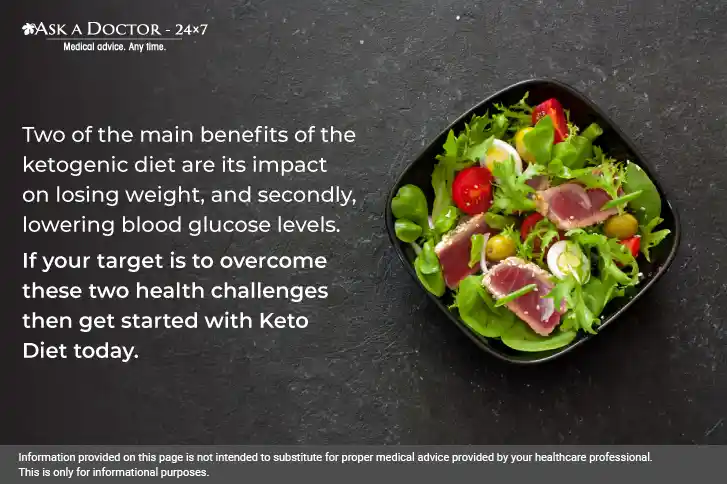8 FAQs On Keto Diet
Do you want to begin with the keto diet and have many unanswered questions hovering in your mind? Like you, many others want to know about the ketogenic diet in detail before getting started. So, here in this blog, we’ve gathered a list of answers to the eight most frequently asked questions about the Keto Diet.
Read on to unravel the facts about this awesome, 'short-term' diet plan…
8 FAQs About Keto Diet

Q.1 What is the Keto Diet?
A ketogenic diet or keto diet is a low carbohydrate, high fat, and moderate protein diet. Initially, it was introduced to treat some specific medical conditions such as diabetes, epilepsy, and Alzheimer's disease under the close supervision of a medical team.
However, the keto or low-carb diet creates a huge buzz in the weight loss industry due to its positive result in quick weight loss.
Q.2 What is Ketosis?
A state of metabolic transformation allows the body to sustain in a deprivation condition. In this stage, the body breaks down the ketones - the liver produces from fat instead of carbohydrates.
To achieve the ketosis stage our body requires 75 percent of calories from fat, 5 percent calories from carbohydrates about 25-30 grams per day, and 15 percent calories from protein with the time duration of more than 72 hours.
Q.3 Does the Keto Diet Help in Weight Loss?
While following the keto diet your body changes its way of using food for energy. Usually eating a carbohydrate diet provides energy to your body to complete all the actions. The keto diet diminishes the number of carbs you consume and guides your body to burn stored fat for fuel instead.
Q.4 What Foods You Can Eat in the Keto Diet?
Your diet must comprise the listed foods:
- Meat: red meat, bacon, chicken, turkey, ham
- Eggs & Fish: whole eggs, salmon, tuna, mackerel, trout
- Low-carb veggies: green leafy vegetables, onion, garlic, tomatoes, etc.
- Condiments: herbs, and spices
- Butter and creams
- Nuts, seeds and avocado
Q.5 What Foods One Should Avoid in the Keto Diet?
Here is the list provided to eliminate certain foods while following the keto diet:
- Grains and starches: cereal, wheat-based products, rice, pasta, potato, colocasia, sweet potato, etc.
- Sugary foods: cakes-pastries, sugary beverages, soda, ice cream, etc.
- Fruits: All types of fruits except a small portion of berries.
- Beans and legumes: peas, kidney beans, lentils, chickpeas, etc.
- Alcohol: Wine, mocktail, beer, liquor
- Sugar-free diet foods: sugar-free candies, desserts, sweeteners, candies, etc.
Q.6 What are the Benefits of the Keto Diet?
Here are 5 proven health benefits of the Keto diet:
- Control Diabetes: A low-carb diet may help to prevent the spike of glucose concentration or sugar in the blood and reduce insulin resistance.
- Reduces acne breakout and certain skin conditions: By reducing the amount of carbohydrates and eating healthy fats, a Keto diet may help to improve skin texture and acne breakout.
- Reduces frequency of epilepsy: The keto diet was initially started in the 1920s for epilepsy only. It effectively helps to reduce the frequency of fits.
- Helps to manage Polycystic ovary disease (PCOD): A ketogenic diet, which lowers insulin production and insulin needs as well, thus may help to manage PCOD with other lifestyle changes like exercise and weight loss.
- Improve HDL level or good cholesterol: The keto diet allows a person to take healthy fats such as nuts, seeds olive oil, etc. helps to improve HDL also known as “good cholesterol” and helps to reduce bad cholesterol and artery wall pressure thus preventing from blood pressure and other heart conditions.
Q.7 What are the Dangers of the Keto Diet?
The high-fat, low-carb plan promises quick weight loss, but Keto also comes with certain complications, The Five most common keto diet dangers include:
1. Keto flu: As we strictly restrict the amount of carbohydrates from our diet which act as a major fuel for our body we may experience similar symptoms to the flu. You might suffer from symptoms like headache, fatigue, nausea, constipation, and insomnia.
2. Renal stone: Consuming high animal food such as meat, eggs, and cheese may increase the load on the kidney due to the keto diet may increase the risk of renal stones and other kidney diseases.
3. Nutrient deficiencies: Since the keto diet restricts several foods, especially nutrient-rich fruits, whole grains, and legumes, it may lack many vitamins and minerals. Research says the keto diet is deficient in magnesium, calcium, Vitamin D, and phosphorous.
5. Risk of low blood sugar levels: A majority of cases showed positive results of the keto diet to control diabetes.
However, people with type 1 diabetes may be in a danger zone on the keto diet due to frequent episodes of low blood sugar levels which confuse, shakiness, fatigue, and sweating. Individuals may undergo a hypoglycemia (low blood sugar) phase which leads to coma and death if not treated.
6. Increases heart disease risk and high levels of LDL cholesterol: Several studies declare that following a low-carb diet increases the cases of high levels of LDL level (low density of lipoprotein) and other associated heart diseases. This is because the keto diet allows one to consume a high-fat diet with a restricted amount of low carbohydrate intake.
Q.8 Is a keto diet a safe option to lose weight?
The Keto diet is a restricted carbohydrate, high-fat, and moderate protein diet that forces your body to use different fuels as an energy source. Remember, your body may face some consequences with the benefits while adapting to the Keto Diet.
Conclusion

Several research claim that you may kick start your weight loss plan with the keto diet but only for a few weeks. Then, you must gradually shift to a low-calorie diet or Mediterranean diet. Keto diet is a safe option only for the short term. If you choose to follow it for a long time it may give you many health complications and nutritional deficiencies. Also, in case you have type 2 diabetes, or any other ongoing health condition make sure to talk to a diabetologist before beginning with the Keto diet.
In case you are looking for a personalized diet plan from a certified dietician, then Ask a Dietician Online at Ask a Doctor 24x7. It is an easy and reliable way to begin with individualized guidance while sitting in the comfort of your home.
Recently Answered Queries Related to Keto Diet
Disclaimer: Information provided on this page is not intended to substitute for proper medical advice provided by your healthcare professional. This is only for informational purposes.
Ask a Specialist
Recent Questions


